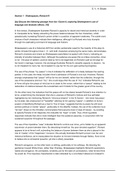S. V. H. Boyes
Section 1 - Shakespeare, Richard III
3(a) Discuss the following passage from Act I Scene II, exploring Shakespeare’s use of
language and dramatic effects. [15]
In this extract, Shakespeare illustrates Richard’s capacity for deceit and rhetorical dexterity in order
to manipulate Anne, falsely subverting the power balance between the two characters, whilst
paradoxically increasing Richard’s power whilst in a position of apparent weakness. The subtle word
choices of both characters indicate their intelligence, although it is Richard who truly triumphs
through his captivating command of language and rhetoric.
Shakespeare’s use of a rhetorical shift from iambic pentameter (used for the majority of the play) to
iambic trimeter throughout lines 1-11, with both characters employing the same metre, demonstrates
Richard’s charisma and charm as Shakespeare assimilates his speech with Anne’s, indicating an
intensity of emotion between them. Although the audience are aware this is a false connection, Anne
is not - the pace of speech could be read by her to be eagerness on Richard’s part as he begs for
her hand in marriage; however, this exchange illustrates Richard’s versatile capacity to deceive - he
is not impatient to marry her, but impatient to use her for his own gain (achieving kingship).
The use of the phrase “my peace” in line 6 indicates the ratification of a treaty between the warring
parties: in this case, the treaty includes Anne’s admission of Richard’s love suit. However, Richard
strongly emphasises that “peace” will be for his own benefit, rather than the collective, through the
use of the possessive pronoun “my”. One could argue that the use of “my” indicates Richard’s use
of Anne will give him peace of mind as he is closer to the crown, rather than a “peace” relating to the
restoration of relations between the Lancastrians and Yorkists for the greater good of the country.
On the other hand, the indication that this peace will not be shared reveals Richard’s true intention to
Anne, undermining the impression that she is unaware of Richard’s motives and true self (later
highlighted by her mentioning Richard’s “timorous dreams” in Act IV Scene I - she never has peace
by his side). Her employment of “hereafter” referring to him gaining “peace”, in addition to Anne’s
evasion of identifying Richard as a man to “live in hope,” suggests that she is aware he will never
achieve political or mental “peace”, particularly in the afterlife. Instead, the use of the collective noun
“all men” draws on the Christian commonplace that everyone lives in hope of heaven - by avoiding
to specify Richard in her response, this indicates his “hope” is futile. Thus, Anne’s guarded
responses indicate that she is more intelligent than the audience assumes, in conjunction with her
sustained suspicion throughout the passage.
The use of the imperative “wear” indicates Richard’s control over Anne, yet is hidden by an apparent
subversion of power between them. By describing himself as “thy poor devoted suppliant”, Richard
appears to be at Anne’s will, subverting the balance of power between them as she is placed in the
role of ‘master’ of his “happiness”; however, this actually illustrates Richard’s power over her and
rhetorical brilliance, as he manipulates the situation to his best interests through flattery. Anne is led
to believe she is somewhat powerful, yet she is utterly powerless.
Richard’s arrogance, on the other hand, is striking, particularly in his soliloquy. By directing the
gentlemen toward White-Friars, rather than Chertsey, Shakespeare highlights Richard’s peremptory
habits and arrogance. He contradicts, evidently just for the sake of contradiction, what he told Anne
he would do. This impulsive characteristic is later reiterated by a nonchalant reference to Edward’s





